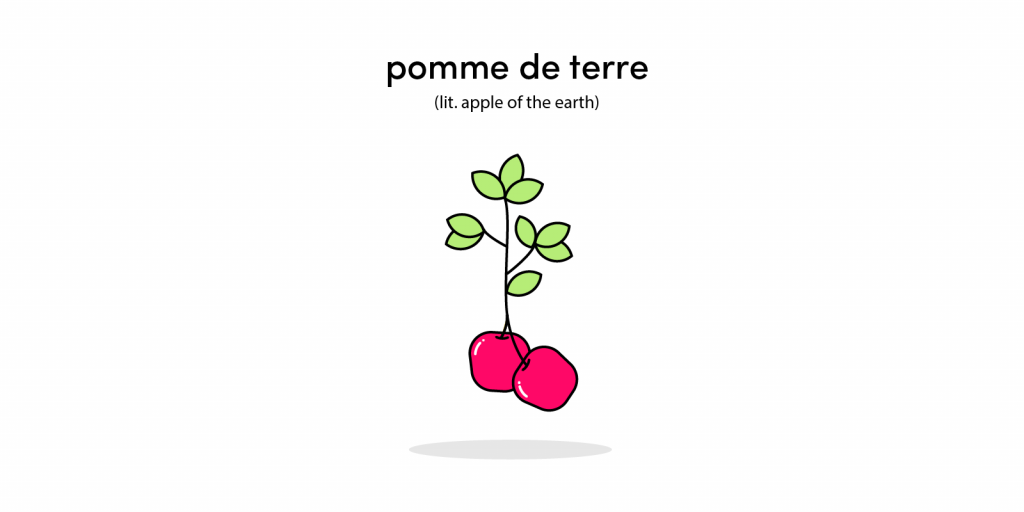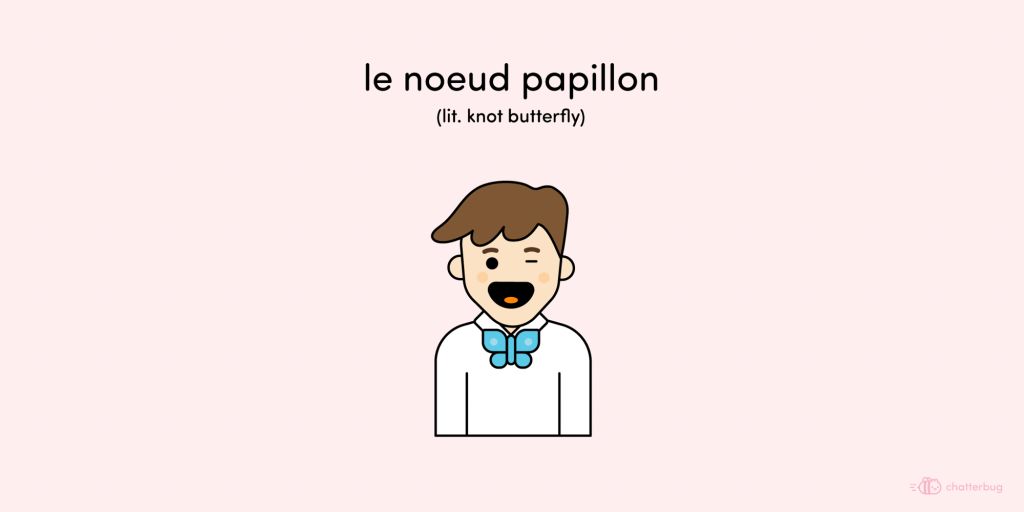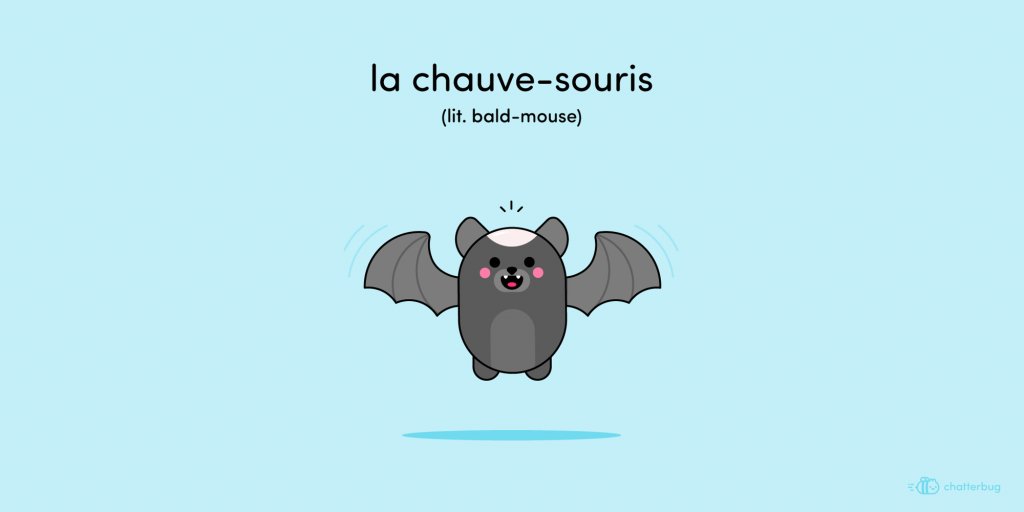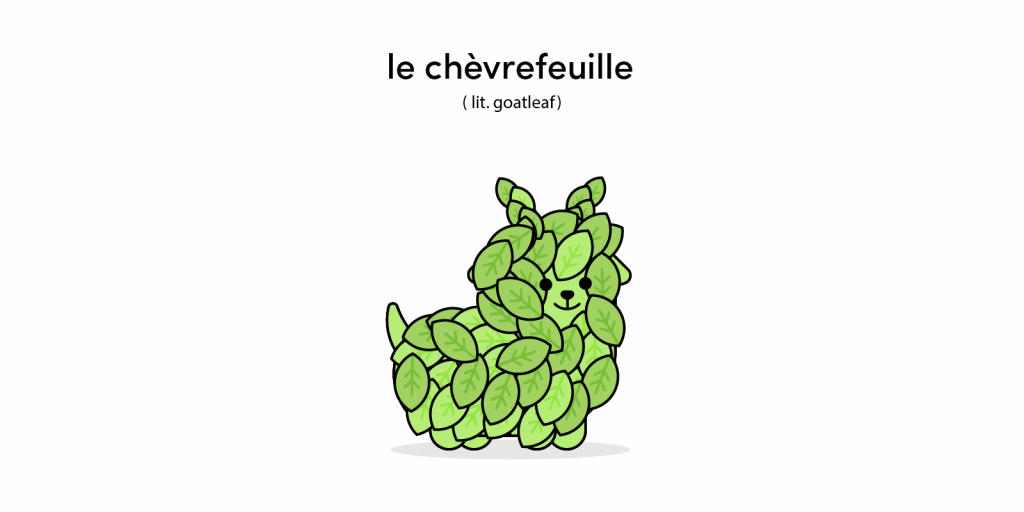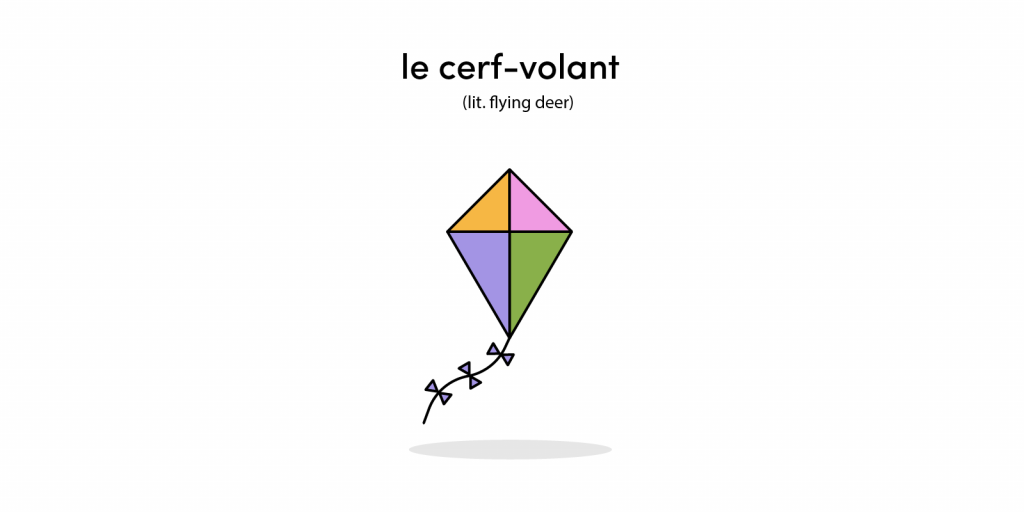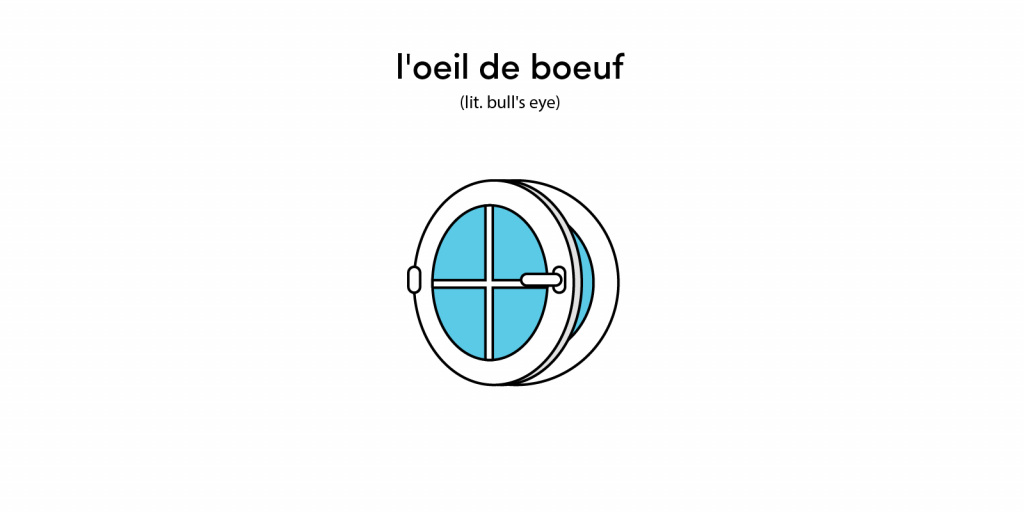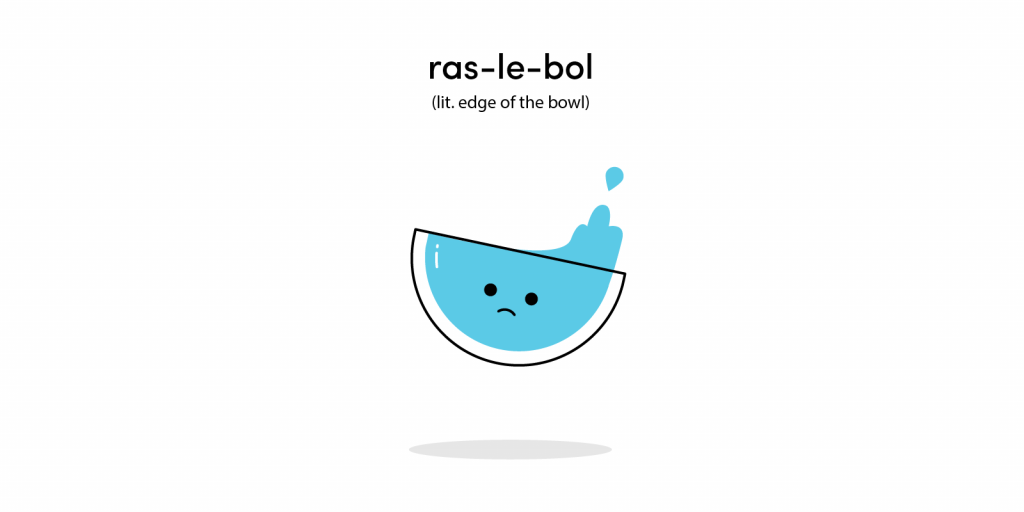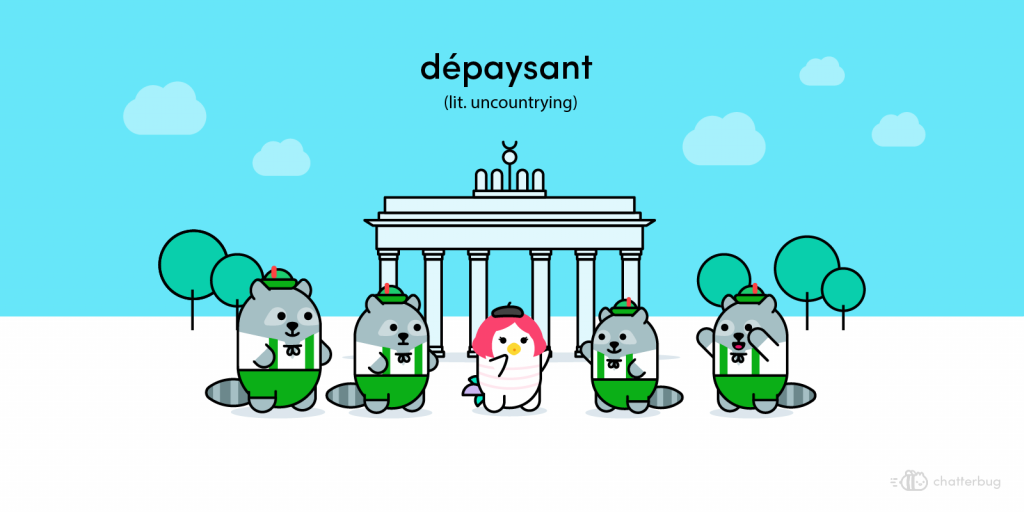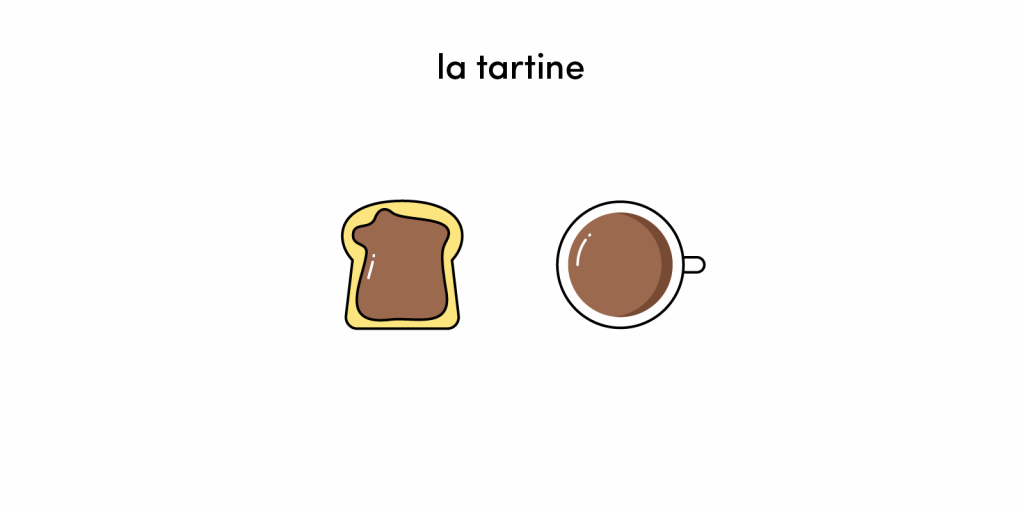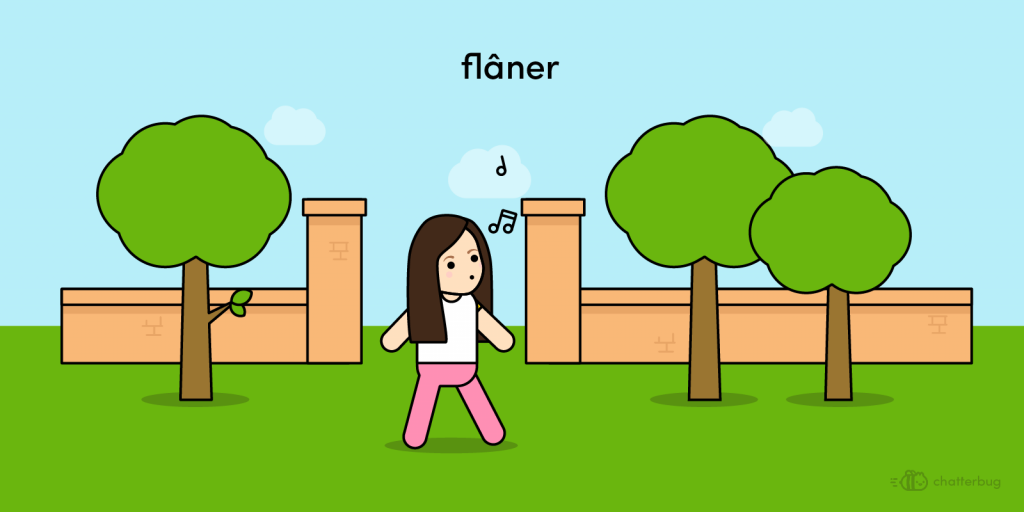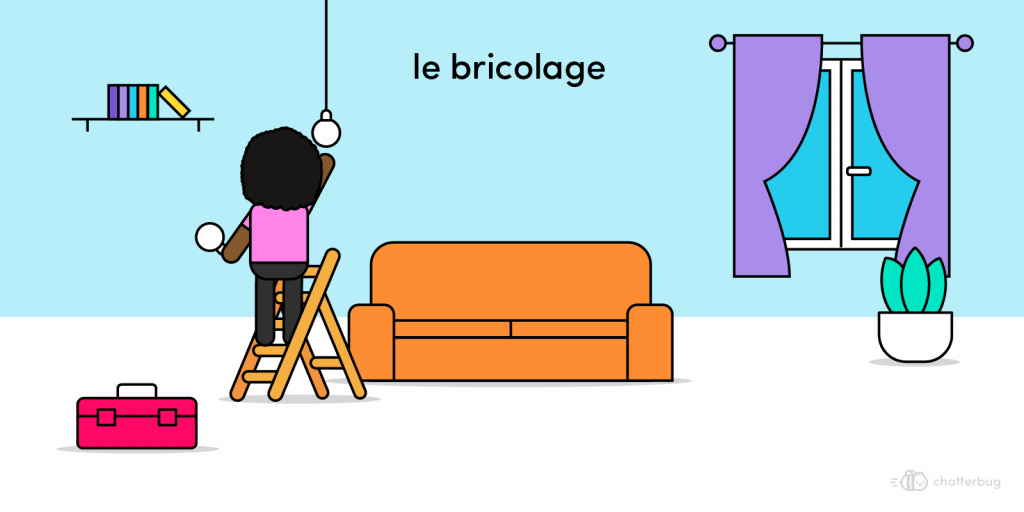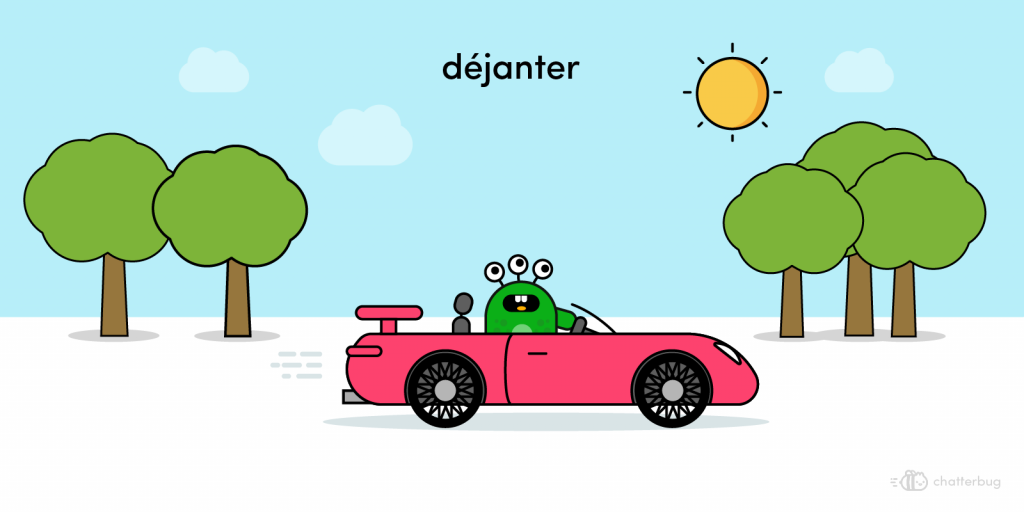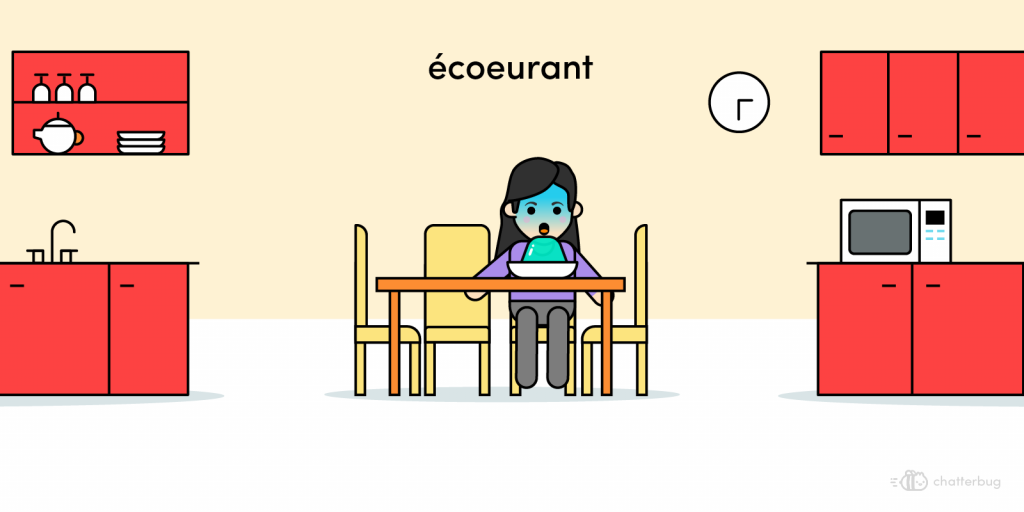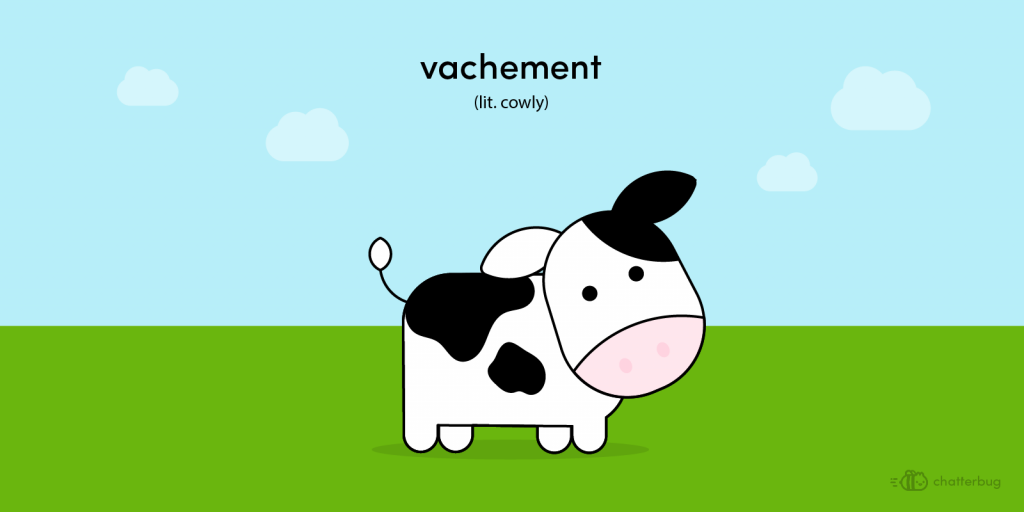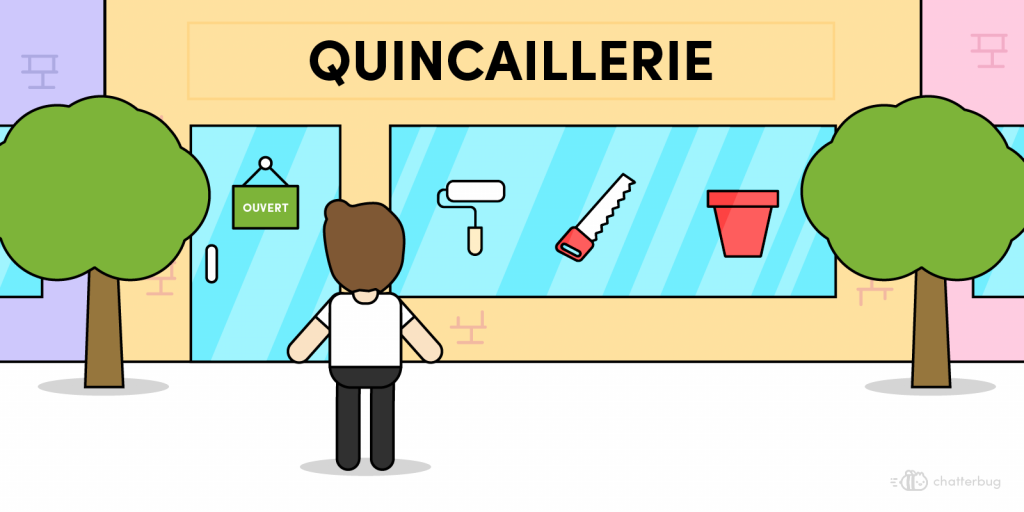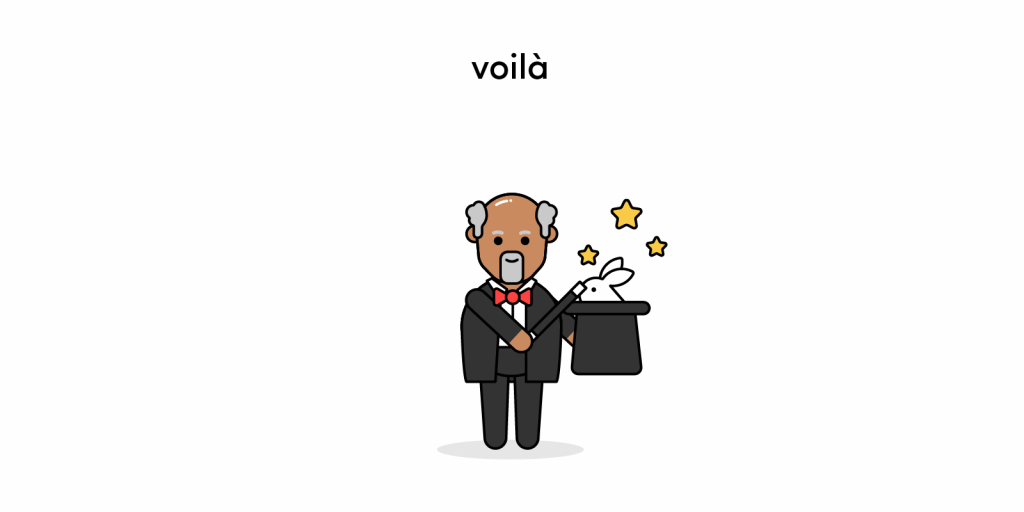There are words and phrases that sound funny in any language, and French is no exception. If you are learning French, it’s useful to know some funny French phrases. Did I mention the group of students who laughed their pointy heads off at the word deuil as they were adjusting to producing its vowel sounds? In this case, their anglophone twist on the sounds of the word played a role in how funny it was to them, but there are also French words and phrases that are funny to any person uttering them, whether or not they are native speakers. Some words seem to be deliberately funny, while others have just turned out to be amusing.
8 Funny French Words
1) abracadabrantesque
Remember the word abracadabra? It is used as an incantation for magic tricks and is spelled the same way in English and in French. In French there is a corresponding adjective, which means preposterous, exaggerated. Its definition in the Larousse appears as: “Qui suscite l’incrédulité par son caractère improbable ou incohérent : Une affirmation abracadabrantesque”. It’s good to have a six-syllable word for something so bombastic.
2) cerf-volant
This could be literally translated as “flying deer”, but is actually the translation for “kite”. I’m not sure if the form of many kites resembles deer, but perhaps the flighty movements of kites bring deer to mind.
3) pamplemousse
This is not mousse that you eat – pâté, chocolate mousse – but grapefruit. It seems odd that a fruit would have the name normally reserved for something prepared to have a smooth texture, but it is actually from the Dutch word pompelmoes – a big lemon – which explains the use of the word mousse in its French adaptation.
4) sardanapalesque
This is another adjective corresponding to a noun. The noun sardanapale has origins in the Latin word sardanapalus, which refers to a powerful man leading a luxurious life. The meanings somptueux, luxurieux, and princier doubtlessly draw from this image.
5) meugler
While the word moo in English seems more of an illustration of onomatopoeia, this French version involves a /g/ that seems a curious component of this sound made by a cow. But, having Latin roots in the verb mugilare, this is in fact the verb you would use to describe the sound a cow makes. You could say “Elle meugle” when referring to a cow, or “Meugles-tu ?” if you address a cow while petting it.
6) vachement
Speaking of cows, when you wish to emphasize something in French, you can use this word, as in the following sentence: “Le TGV est vachement rapide !” The question is, why do we say “cowly” for emphasis?
7) yaourter
To yogurt? First of all, the sequence of sounds involved in this verb is interesting enough, with two vowel sounds in a row that are distinctly French, followed by the French r, and an -er ending from the 1er groupe. The word denotes trying to speak or sing and floundering, especially in a foreign language. A side note to this term is that the singer Seal wrote in the liner notes of his eponymous 1994 album that he didn’t include the lyrics to his songs with his CDs because he wanted to encourage people to respond to the sound and feel of the music. This was obviously before the explosion of the internet and he liked the idea of people relying on what came to their ears to interpret his songs. But was he a yogurt fan?
 machin
machin
This is a synonym for truc. The English versions, whaddyacallit or whatchamacallit, are much less economical. If you momentarily forget a word, don’t feel like saying it, or simply can’t be bothered, you can say things like: “On utilise ce machin pour nettoyer l’écran”. One French woman I met even feminized it when she couldn’t be bothered to come up with people’s names: “Ils veulent tous bavarder juste parce qu’un Monsieur Machin sort avec une Madame Machine…” We were all laughing by the time she was finished speaking.
Other Funny Phenomena in the French Lexicon
1) Words Ending in Three E’s
words ending in three e’s such as the feminine past participle of the verbs créer, agréer, suppléer
Thus, we would write the following:
J’adore les robes que Gaultier a créées.
Les expressions agréées sont une forme de politesse.
Il faut que ces tâches soient supléées par les ressources plus vastes.
2) Words that are Feminine in the Plural and Masculine in the Singular
After learning all about gender distinction in the French language, you will be thrilled to learn that the following nouns change genders, depending on whether there is one or more of them: amours, délices, orgues. Thus, we say amours enfantines, but amour éblouissant ; belles délices, but délice somptueux ; orgues mélodieuses, but grand orgue.
3) The Word Gens
Although only used in the plural form, this word resembles the preceding words in that it sometimes takes on a feminine role and sometimes takes on a masculine role. According to the Académie française, this is due to its feminine etymological background, coupled with its expression of an idea that is considered masculine. Generally, prenominal adjectives that have distinct feminine forms are used in the feminine along with gens, while adjectives that appear after the word are used in their masculine form, e.g., ce sont de petites gens ; parmi ces gens nombreux. The prenominal feminine adjectives that appear along with gens do not extend to other components of sentences in which they appear, with the exception of toutes and quelles when used alone or with feminine prenominal adjectives, e.g., ces vieilles gens sont heureux ; toutes bonnes gens ; quelles belles gens ! With other adjectives the masculine form is used, e.g., quels honnêtes gens ; tous les jeunes gens. Used with a complement introduced by de designating a quality, profession, or state, the preceding adjective will be masculine, e.g., tous gens de lettres ; les grands gens de bonne volonté.
4) où
There is one word in French that uses u with the accent grave – où. It is thus distinct from the conjunction ou. The letter u is more often seen with a circumflex or tréma, e.g., dû, capharnaüm.
Funny French Expressions
1) l’esprit de l’escalier
Do you ever find yourself coming up with the perfect comeback – ten minutes after your conversation ended? This is an example of l’esprit de l’escalier, which the twelve-year-old narrator of Muriel Barbery’s L’Élégance du hérisson describes when she talks about not finding the right réplique at the right moment, but after too much time has elapsed. Her BFF, however, comes up with snappy responses right away, which is something Barbery’s narrator admires about her.
2) chercher la petite bête
There are those who love to split hairs, fixating on the most minute details and losing sight of, or directing attention away from, the larger picture. There is a moment in Yasmina Reza’s play Art when one of the characters accuses his friend of doing this very thing during a heated discussion over the significance of a completely white and very expensive canvas. When one friend asks how white lines are visible on a white canvas, the other, who is incensed by the enormous cost of the painting which to him looms over all of its other characteristics, says: “Tu cherches tout de suite la petite bête. Tu ne me laisses pas finir !”
3) il y a quelque chose qui cloche
This expression conveys the idea of something being wrong, seeming incongruous, not sitting right. The idea of incongruity is present in the phrase from Michel de Montaigne’s essay De l’expérience, “tout exemple cloche”, which he uses to illustrate the singularity of a particular example, its uniqueness, even in its position as part of a larger category.
4) un froid de canard
This phrase is particularly useful in certain parts of the Northern Hemisphere at the moment, at it indicates an intense cold. The image comes from the hunting of ducks, who glide in and out of water easily, but not when it is frozen over, making them easier targets for hunters during colder periods. Speaking of fowl, how about this anecdote: “C’est une poule et un canard ; la poule dit au canard: il fait un froid de canard ; le canard dit à la poule : j’ai la chair de poule”.
You May Also Like:
- How to Use «The Passive Voice» in French
- How to Use The French Pronouns Y and EN
- How to Express Times and Dates in French
- Free PDF Download: Guide to French Pronunciation & Grammar
- Free PDF Download: Beginner’s Guide to French Grammar and Word Order
Subscribe to The Glossika Blog
Get the latest posts delivered right to your inbox
“Do you eat apples of the Earth?”, “You should wear a knot butterfly at the wedding”, “My grandma’s house has two beautiful ox’s eyes”, “I have an irrational fear of bald-mice.” are all perfectly understandable sentences for someone who speaks French. Translated into English, however, the wording sounds a little bit funny.
When learning a language, we often come across words that, translated into our own language, seem bizarre, stupid or funny. In fact, those are the words that I find the most interesting and the most memorable. Take the English word “dragonfly” for instance. Sure, it has nothing to do with a flying dragon like I imagined them (do you also picture the ones from Game of Thrones?) but it’s so unexpected that it’s actually pretty easy to remember it. In German, the word for plane is also pretty funny: “das Flugzeug” literally translates, in my mind, as the “flight stuff”. Yes, it might not make sense to someone else, but to me it’s a perfect mnemonic way to learn vocabulary.
Thankfully for you – or unfortunately, your call – the French language has some wonderful funny words of its own. Don’t forget: it may not make sense to you but it does for French speaking people.
La pomme de terre
This may be the most common and strange compound word of the French language. Literally, it translates as “apple from Earth” or “apple of the Earth”, it actually means a mere potato. Weird, when we know that a potato is not a fruit but a root… And to confuse things even more, you’ll often hear French speakers call a “pomme de terre” a “patate” in colloquial French.
Le noeud papillon
“Le noeud pap”, as the French would say, is a very fancy piece of clothing usually worn only on special occasions like weddings or balls. It seems that a knot butterfly, as the literal translation suggests, is for French people’s mind a very accurate description of a bow tie… Why not?
La chauve-souris
What is the difference between a mouse and a bat in French? Apparently one of them is bald! Formed with the words “chauve” (bald) and “souris” (mouse), the French word for bat doesn’t seem to make much sense. Originally, it may have come from “chouette-souris” (owl-mouse) because they are nocturnal animals but was transformed into “chauve-souris”, which is a lot funnier indeed.
Le chèvrefeuille
Ok, this one isn’t as popular as the others but its name is definitely as interesting. Even if we know the words “chèvre” (goat) and “feuille” (leaf), this still doesn’t help guess that “chèvrefeuille” is nothing but “honeysuckle” in English. To confuse things even more, according to the legend, the sprouts of this aromatic plant were eaten by roe deers, called “chevreuil” in French. Anyway, it’s still has nothing to do with goats…
Le cerf-volant
You would probably call me crazy if I was telling you that we can see a lot of “flying deers” on the beaches in France, particularly in the city of Berck, in the north of France. Would it make more sense if I told you that this is what we call kites in French? Originally, the word “cerf” (deer) was badly translated from the word “sèrp” (meaning “snakes”). Therefore, we shouldn’t call them “flying deers” but “flying snakes” (serpent-volant). But that would be weird, right?
L’oeil de boeuf
An ox’s eye can be three things in French: the literal eye of an ox, a peephole or a very cute and practical window in a building. In the shape of an oval, the bull’s eye (as they are also called in English), is a small window located in the upper part of a building, or in the attic, to let the light in and ventilate a place. Now, if someone’s talking about “un oeil de boeuf”, they are most likely talking architecture rather than anatomy.
Ras-le-bol
A bowl full of it is quite a good image to express what this word figuratively means in French. If it happens to you it means you’ve had enough of what was pouring into the bowl. Listen carefully to French speakers and you’ll surely hear a lot of them say “j’en ai ras-le-bol !” when talking about their work, their children or life. That sounds depressing? Well… After all if you’ve had your bowl full it’s because you’ve had too much of something, you’re fed up and a bit depressed by your surroundings and your situation.
…and 12 funny French words that may not exist in your language
If you ever studied French, you surely have realised by now that the French language is full of funny words, to use but also to pronounce, and that unlike in English or in German, it is nearly impossible to make up a word because there’s probably one that already exists!
How many times have you come across a French word that was untranslatable in your own language? Hopefully, not many. Yet, it might happen more than you’d expect. Yes, the French language may be beautiful to hear, romantic and sexy but did you know it could also be funny and help you express feelings you didn’t know you had? Here’s a non-exhaustive list of French funny words that (maybe) don’t even exist in your language!
Dépaysant
This is surely what happens to anyone going to a foreign land for the first time: it’s unfamiliar. This adjective comes from the word “pays” (country) and the prefix “dé” which shows a negation. Imagine going in a different country where you have no landmarks or points of reference, whether it’s the climate, the landscape, the language or your habits. If you feel lost and disoriented by your surroundings, but in a positive way, or if you are just in a place where your daily life is a long gone memory, this is probably the right time to use this sentence: “c’est dépaysant !”
La tartine
When it comes to food, there are obviously many French dishes that come to mind. But have you ever heard of the “tartine”? It’s not really a dish per se but it’s quite popular as breakfast, lunch, goûter and apéritif among French people. Take a piece of fresh bread, nicely sliced, add butter or chocolate spread or ham or cheese or even hummus or guacamole on it and bam!, you’ve got yourself a “tartine”! Tartine de pain beurrée (buttered tartine) dipped in hot cocoa is a most favourite at breakfast.
Flâner
If you like lazy Sundays or if you just love walking aimlessly, just for the pleasure of walking, this verb may come as very handy for you. And, if you do this often, you can surely call yourself a “flâneur” or “flâneuse”.
Raplapla
This funny sounding word isn’t particularly positive. Used mostly in a familiar context, it describes the feeling of being tired, unmotivated, deplete and depressed all at the same time. Let’s hope you won’t come to that by the end of this article! If it’s not a good description for yourself, you can also use it to describe something that is deflated.
Pantouflard
To understand what a “pantouflard” is you first need to know that the word “pantoufle” translates as “slipper” in English. So, does that mean that a “pantouflard” is someone always wearing their slippers? Yes, pretty much. By extension, it is someone who likes staying home rather than going out to party or meet friends, who likes his habbits and his tranquility. I guess you could say that Chatterbug fits best the “pantouflard” that sleeps in us, right?
Le bricolage
Doing small repairs at home is one of the most popular past-times among the French people. But before you imagine the whole nation being quite handy, know that “bricoler” isn’t very demanding and doesn’t require special training. Every one loves it because every one can do it. It’s a mix between DIY projects (like building a bench for your garden), small repairs (like changing a lightbulb or fixing a door handle) and home improvements (like painting the bedroom). Yes, we can!
Déjanter
If you keep saying nonsense or if you are off your head, a French person could say: “tu es déjanté !”. Well, maybe not the young people… Fun fact: “la jante” is actually the rim of a car’s wheel. Now, why would taking the rim off your car would ever be associated to saying nonsense? This will remain a mystery of the French language.
Écoeurant
It doesn’t help to understand this one to notice the word “coeur” (heart) in there. Funnily, when the French people talk about nausea they often refer to the word “coeur”. Take for instance “le mal de coeur” (heart pain) which stands for motion sickness, and which is completely unrelated to our vital organ. In France, when a situation or a food is “écoeurant” it means it’s nauseating or sickening. It repulses the person. But, be careful, in Canada and Québec particularly, “écoeurant” is a very positive word that means “it’s good” or “it’s awesome”.
Vachement
Kids would certainly be told by their parents not to over use this word outside the house. “Vachement” isn’t very formal or polite but it is certainly massively used in France as a synonym of “a lot”: il y a vachement de monde ici = there’s tons of people here. Oh, and yes, it comes from the word “vache” (cow).
La quincaillerie
If you also like “le bricolage” like many French people do, this type of store may come in handy for you. Before we could find everything in a supermarket, French people would go to a “quincaillerie” (pronounce k-ain-kah-yuh-ree), a smaller store where one could find literally everything: tools, toys, kitchen utensils, sports equipment, garden accessories…
Cartonner
We don’t know what cardboard boxes (carton) have to do with it but “cartonner” or “faire un carton” describes a big success. Apparently, it would come from the cardboard targets in the shooting stalls of the fairs. If you hit them all, you are indeed very successful or very good at what you’re doing.
Voilà
Here’s a word that is used in many languages. “Voilà” can either conclude a story, introduce a person or thing, attract people’s attention to an event or indicate an explanation. Et voilà!
Funny French Slang – Verlan
Finally, if you want to master more colloquial French, watch this video to get familiar with ‘Verlan’, French slang. If you don’t end up brain-fried by this nonsense of shredded mixed syllables, you will be young and hip forever.
We hope you’ve enjoyed our collection of funny French words. If you’re interested in pursuing your knowledge of funny words in other languages, see what you think of these funny German words or funny Spanish expressions. Or if you’re up for a challenge, head to our YouTube channel to try and learn some Spanish, German or French slang!
Et voilà!
Want to learn more?
If you’re feeling inspired, sign up below for a free two-week trial and a Live Lesson with a private qualified tutor to start speaking a new language for real! Our classes are structured around exercises created by language teachers, so there’ll be no awkward silences – we promise! 😉
Don’t forget to check out our Facebook, Twitter and Instagram pages for more language content!

By
Last updated:
March 31, 2023
There are tons of words that you’ve been using since day one of learning French, but how many cool French words do you use in your conversations?
Learning unique French words and phrases will help you build your French vocabulary and communicate effectively in the language.
In this post, we’ll teach you 21 cool and unique French words that you can use in your conversations to help you sound like a native speaker!
Contents
- Unique and Cool French Words That’ll Make You Sound Like a Native Speaker
-
- 1. Débrouillard
- 2. Cochonnerie
- 3. Bêtise
- 4. Bon vivant
- 5. Astre
- 6. Regard
- 7. Tête de pioches
- 8. La grasse matinée
- 9. L’embouteillage
- 10. Avocat
- 11. L’ennui
- 12. Mince
- 13. Gueule
- 14. Gueule de bois
- 15. Nostalgie de la boue
- 16. Cartonner
- 17. Ras-le-bol
- 18. L’appel du vide
- 19. Jolie Laide
- 20. Contresens
- 21. Empêchement
- What’s So Useful About These Cool and Unique French Words?
- Finding More Unique Words for Your Vocabulary
Download:
This blog post is available as a convenient and portable PDF that you
can take anywhere.
Click here to get a copy. (Download)
Unique and Cool French Words That’ll Make You Sound Like a Native Speaker
Here, we have compiled a list of 21 unique and cool French words for you to add to your vocabulary to sound like a native speaker!
1. Débrouillard
A rough translation of this word would be “resourceful” or “wily,” but it really doesn’t have a true English equivalent.
In French, a débrouillard is a person who is able to take care of things for themselves. When life gets tough, they can overcome difficulties without much help from others. That isn’t to say someone who’s débrouillard won’t ask for help—they will, if they need to get things done—but they don’t depend on other people to solve their problems for them.
How it’s used:
My mother used this word when I was being a whiny kid: Débrouille-toi ! (Figure it out!)
It can also be used to refer to a positive character trait: Le garçon est jeune mais débrouillard. (The boy is young but resourceful.)
2. Cochonnerie
This word may remind you of the French word cochon (pig), and it’s actually not far off.
Cochonnerie is used in a variety of situations, but the connotation is negative, as it can mean “junk” or “rubbish.” You may use this word to refer to junk food, or to something useless.
How it’s used:
If you want to refer to food, you could use this word in a phrase like: La nuit d’Halloween j’ai trop mangé de cochonneries. (On the night of Halloween I ate too much junk food.)
In a different setting, a teacher may tell her class to stop misbehaving with the warning Arrêtez vos cochonneries ! (Stop this nonsense!)
3. Bêtise
This word literally means “stupidity,” but it goes much deeper than that. This is another word that doesn’t directly translate to English. It’s used to describe a behavior or action that lacks basic intelligence, common sense or judgement. However, it can also be used in a variety of other unexpected ways.
Note that a different form of this word, les bêtes , can refer to animals, and colloquially this word can be used to describe someone who has been working very hard comme une bête (like a dog).
How it’s used:
If a group of teenagers are engaging in what might be described as rebellious or risky behavior, such as coming home past curfew, their parents might say: Les adolescents font des bêtises. (The kids are being stupid).
4. Bon vivant
Bon vivant literally translates to “good liver” in English, which doesn’t quite have the same ring to it, although we would refer to a bon vivant as someone who “lives it up.”
How it’s used:
The French use this as a way to describe someone who enjoys the finer things in life.
An example would be:
Tu sais que Depardieu boit 14 bouteilles d’alcool par jour ? (Did you know Depardieu drinks 14 bottles of alcohol per day?)
N’importe quoi ! Mais c’est vrai que c’est un bon vivant ! (No way! Although it’s true that he’s living it up!)
5. Astre
Astre translates to “celestial body” and is often used as another word for étoile (star) but the difference is that astre doesn’t mean star. It’s an unspecific term that can signify anything from “star” to “planet” to “angel.”
La nuit j’adore regarder les astres. (At night I love looking at the stars.)
How it’s used:
Astre is basically used to describe something luminary and otherworldly, and can even be used in reference to people. For example:
T’es belle comme un astre ! (You’re as beautiful as an angel!)
6. Regard
Aside from being a verb form that comes from the infinitive regarder (to look/watch), regard can also be used as a noun in French.
How it’s used:
It alludes to the expression of someone’s eyes, so in that sense regard is comparable to the English word “gaze.” For example, someone might say:
Quel regard ! (What expressive eyes!)
But it signifies so much more than that. It also refers to a look and a presence that’s expressed solely through the eyes.
For example, when you hear something like, avec son très beau regard il va avoir du succès dans sa carrière de comédien , in English we could translate it to something along the lines of “with such a piercing gaze he will be successful in his acting career.”
7. Tête de pioches
You may be familiar with French terms of endearment, such as mon chou (my sweet bun) or mon coeur (my love). Tête de pioches is the opposite.
This is something you might say to someone who’s acting without rationale or forethought. Perhaps they were engaged in bêtises (stupidity) or cochonneries (nonsense). This term translates roughly to “blockhead.”
How it’s used:
I’ll leave it up to your discretion for what circumstance you’ll save this phrase, but it’s not something you’d use in a formal setting! A mother may refer to her careless child as a tête de pioches the 10th time they knocked over a water cup at the dinner table (not that I speak from experience…).
8. La grasse matinée
You’ve woken up later than usual without an alarm. You slowly pad around the kitchen fixing a cup of coffee and a piece of toast… then get right back in bed. You might lie there while the coffee brews, scrolling on social media or watching your favorite TV show. A lazy morning sleeping in—this is what grasse matinée refers to, even though it translates literally to “fat morning.”
How it’s used:
Use this whenever you want to describe the best kind of morning: slow, relaxed and with nothing pressing on the agenda. If you enjoyed sleeping in this morning, you might mention, j’ai fait la grasse matinée jusqu’à midi. (I slept in until noon).
9. L’embouteillage
Translated in English to “bottling,” this word is used to describe slow or congested traffic.
How it’s used:
You would use this word just as you might in English. You might say, il y avait de l’embouteillage sur la grande route ce matin. (There was slow-moving traffic on the highway this morning.)
10. Avocat
This word can mean two completely different things. Depending on the gender and the context, avocat could translate to “lawyer” or “avocado.”
Although the gender can help to distinguish which you’re talking about, this can get a little confusing because the masculine form of avocat (un avocat ) can mean male lawyer or avocado. However, the feminine version, une avocate , means female lawyer.
How it’s used:
This one’s pretty self-explanatory, but as we’ve seen, you’ll be relying on context here because gender may sometimes lead you astray. Let’s just say that you’ll have to assume your audience isn’t bête (stupid) and will have the common sense to know whether you’re referring to an attorney or the main ingredient in a bowl of guacamole.
11. L’ennui
You may have seen this word referenced in English, and like other French words, it’s been adapted for use outside of the French language sphere.
That said, this is another of those French words that doesn’t quite have the same connotation in English. A rough equivalent may be “boredom,” but there’s more to it than that.
How it’s used:
This word can change its meaning depending on the setting. You might say, je m’ennuie ! (I’m bored!), but if it’s pluralized (by adding an s), the word refers to troubles or nuisance: des ennuis au bureau (trouble at the office).
12. Mince
A rough equivalent of this word would be “shoot” or “darn,” although it translates literally to “thin.” This is a slang word that can be used to express mild frustration or annoyance.
How it’s used:
You could use this in most settings without too much concern for company. Whether you just stubbed your toe or loaded the wrong powerpoint presentation at a big meeting, you’d be safe to exclaim, mince !
13. Gueule
In French, gueule can be used various contexts. On its own, this word literally translates to “the mouth of an animal.”
How it’s used:
Gueule is commonly used in French to refer to someone’s face or head.
The word gueule generally has a negative connotation:
Avec une gueule comme ça il va surement avoir le rôle du criminel. (With a face like that he’s surely going to get the role of a criminal.)
The French also use it to tell someone to ferme ta gueule ! “Shut your mouth!” (You can drop the ferme for the more colloquial ta gueule ! )
14. Gueule de bois
Gueule de bois literally means “wooden throat/mouth.” This is a form of slang that refers to a hangover.
This expression comes from the feeling one might get after a night of drinking that leaves the throat dry and dehydrated.
How it’s used:
Hopefully you won’t often experience that regretful feeling after a late night out, but next time you do, you can say: J’ai mal à la tête ! J’ai la gueule de bois. (I have a headache! I’ve got a hangover.)
15. Nostalgie de la boue
Nostalgie de la boue literally translates to “longing for the mud” and was coined by Émile Augier, a French dramatist and poet. In English, we don’t have an expression that conveys the exact meaning of this, so naturally we adopted the French phrase.
How it’s used:
This expression can be used to refer to various situations, but generally it’s used to refer to people who desire something lower than what they’re accustomed to.
For all you literature fans out there, an example of this can be found in “Lady Chatterley’s Lover.” When Constance (Lady Chatterley) confesses that she’s pregnant with Mellors’ child (Mellors is a working-class man), her husband, an upper-class man, responds to this by saying she’s insane and has nostalgie de la boue.
16. Cartonner
This verb has various meanings, so it can be translated into different things in English including “to crash,” “to bind” and “to attack.”
How it’s used:
With the surge of French slang making its way into everyday vocabulary, it’s now more often used to express the success or greatness of something.
You may come across the word cartonner in the discussion of successful films, music and books. Did you just watch a really great movie at the cinema? You could say ce film a cartonné ! “This film smashed it!”
Cartonner can also be used in regard to people. If you think someone is awesome you can simply say tu cartonnes ! or “you’re the bomb!”
17. Ras-le-bol
The term ras-le-bol literally translates to “bowl full of it” in English, although this isn’t a foodie term!
How it’s used:
Ras-le-bol is generally used to emphasize frustration and agitation, kind of like when you’ve had enough of something and you’re now reaching the point where you can’t take any more.
It can be used in the following way: J’en ai ras-le-bol ! which basically translates to something along the lines of “I’m fed up!” or “I’m sick and tired of it!” in English.
18. L’appel du vide
This literally translates into English as “the call of the void.” Even though we can translate this word for word, we don’t have an exact expression for what l’appel du vide conveys.
How it’s used:
L’appel du vide is used to refer to that inexplicable and uncontrollable urge to jump that even perfectly level-headed people with no desire to really jump may experience when standing on the edge of a cliff:
J’ai gravi la montagne et lorsque j’ai regardé la vue autour de moi, j’ai senti l’appel du vide ! (I climbed the mountain and when I looked at the view around me, for a moment I had an instinctive urge to jump!)
In French, l’appel du vide refers to all of those indescribable instinctive urges to do something unimaginable that appear almost out of nowhere. It’s a phrase perfectly coined to express those existential crises in life. So, next time you feel like doing something crazy, remember this phrase.
19. Jolie Laide
What could be more French than seeing beauty in everything? Being attracted to unconventional beauty of course! Thanks to the likes of Serge Gainsbourg (and his song titled: “Laide Jolie Laide”) there’s a term for those unconventional beauties, and that term is jolie laide.
How it’s used:
Jolie laide directly translates to “pretty ugly” in English. The term conveys the uniqueness of someone’s beauty, something atypical that challenges or isn’t aligned with conventional beauty standards.
While jolie laide isn’t a popular expression that pops up in day-to-day conversation, it’s something you may come across in fashion publications and blogs thanks to the online world; and of course it’s a term the English speaking world has adopted.
Charlotte Gainsbourg est vraiment une jolie laide would translate to something like “Charlotte Gainsbourg is strangely attractive.”
20. Contresens
Contresens is the French word for “misinterpretation” so if you’ve ever made an error in your French translation, you may remember your teacher saying: Ce n’est pas correct, c’est un contresens (This isn’t right, it’s a mistranslation.)
How it’s used:
Contresens isn’t just reserved for those things lost in translation, it’s kind of lost in translation itself as the word is literally made up of two other French words: contre which means “against” and sens which means “direction.” So contresens can also be used to mean “reverse,” “opposed,” “opposite” and “the wrong way.”
Nous avons descendu la rue à contresens ! (We went down the road the wrong way!)
21. Empêchement
In English, the word empêchement would translate to unforeseen difficulties, hold-ups or last minute changes.
How it’s used:
It’s used to insinuate that something unexpected has popped up that can ultimately ruin an arrangement or a rendez-vous , so there’s no need for any further explanation as this one word really says it all:
Je suis vraiment désolé mais j’ai un empêchement (I’m really sorry but I’m going to have to cancel what we planned as something has come up!)
It’s the most common and convenient way a French person will get out of a plan or a commitment, and all this is without having to explain anything!
J’ai un empêchement pour ce rendez-vous. (I can’t make it to the meeting because of unforeseen difficulties.)
What’s So Useful About These Cool and Unique French Words?
Learning some fun, cool French words won’t just expand your vocabulary and help you communicate, but will also benefit your language studies in bigger ways.
- They’ll reinvigorate your motivation to learn: Think back to the first time you heard someone speak French. You may have felt a deep sense of awe at how beautiful the language sounded.
There are many cool French words, like the ones we’ve discussed above, that can take you back to this feeling—whether they sound incredible, have interesting definitions or express something we don’t quite have a word for in English.
- They’ll give you a brain boost: Research shows that learning foreign vocabulary is good for your brain. Taking the time to study new and interesting French words will exercise your brain and keep you on your A game in all areas of your language studies (and beyond!).
Finding More Unique Words for Your Vocabulary
The words listed above are just a start. If you want to continue spicing up your vocabulary with the most interesting words French has to offer, here are some ways to do just that:
- If you’re interested in words that aren’t easily translatable from one language to the next, you can check out the “Dictionary of Untranslatables.”
- Learning slang is important. Check out this post to learn 40 French slang expressions to make you sound like a native speaker.
- Get authentic exposure to new French words. Immersion is a great way to constantly learn new, interesting words, and you can find great materials all over the internet. FluentU’s language learning platform, for example, offers a library of authentic media clips that are categorized based on difficulty level. Each video comes with interactive subtitles which you can hover over for extra information about the words used.
- Need a reminder that French exists outside of its own bubble? Check out these English words that are borrowed from French.
Now that you’ve learned 21 cool and unique French words, start using them in your French conversations and get them ingrained in your vocabulary.
They’ll soon become second nature to you and your French will sound more fluent!
Download:
This blog post is available as a convenient and portable PDF that you
can take anywhere.
Click here to get a copy. (Download)

When you think of the French language, what comes to mind? Romance? Elegance? Sophistication?
Well, forget all that. The French language is also hilarious – Yes, hilariously funny! Why do we say this? Because the French have some words and phrases that just don’t make sense when translated into English, and they sound downright silly when pronounced correctly. Moreover, there are so many of them that we already have another article on this topic!
Now, the time has come to broaden it a bit. So, without further ado, let’s get to the good stuff: the 14 funniest words and phrases in French. Put on your beret, and get ready for a linguistic adventure!
Learn French with Langster
Avoir des oursins dans les poches
The funny French phrase Avoir des oursins dans les poches literally means «to have sea urchins in your pockets.» This can look confusing at first sight, so what does it really mean?
As it turns out, the phrase originated in the early 1900s and was used to describe someone who was stingy or miserly. The idea refers to sea urchins’ spikes, literally saying that it hurts for the stingy person to get money out of their pocket.
Today, the phrase is commonly used to describe anyone who is tightfisted or cheap. For example, you might say:
French
English
Jean est un tel radin. Il a des oursins dans ses poches.
Jean is such a tightwad. He’s got sea urchins in his pockets.
Grognon/grognonne
The French word grognon (grogonne in the feminine form) is translated to «grumpy.» It sounds just as silly as the English translation – just imagine saying this to someone in the morning:
French
English
You are grumpy this morning!
For us, this sounds instantly funny, and it immediately brings a picture of the dwarf from Snow White saying something in his grumpy voice, but with an amusing French accent. Or maybe Medusa the Gorgon standing right in front of us! Choose your association.
The word doesn’t have an interesting origin, though, as it might seem – it’s simply derived from the French verb grogner (to grunt).
Ducon
This word is the French version of «jerk» or «asshole,” but with a funny nuance. “Con” (or “conne” in the feminine form) is a common derivative and a pretty strong French curse word. But, adding the prefix “du-” to it makes it immediately sound like a royal title. So the literal translation for this funny insult would be “royal asshole.”
Ducon is both insulting and clever at the same time, and while we advise to not use it often, we do acknowledge that the person who came up with it was pretty smart.
French
English
Je n’aime pas Jerry, c’est juste un ducon !
That guy is a real jerk!
Note here that while the feminine version of this word exists (duconne), the masculine version is used most often for all genders.
Tomber dans les pommes
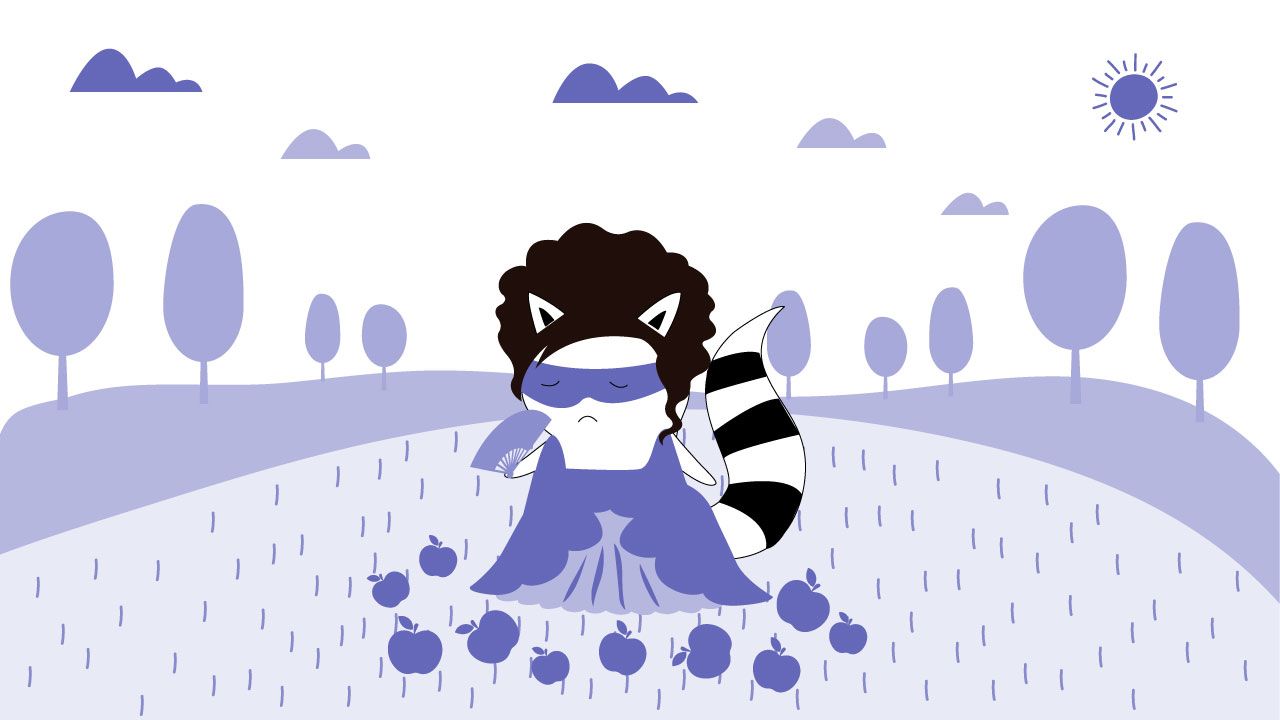
This funny French expression is literally translated as «to fall into the apples,” but it really just means “to faint.” Now, imagine if every time someone lost consciousness, they fell into a pile of apples?
Not the most pleasant fall, in our opinion. But, for some reason, long ago, some French speaker decided that this phrase describes fainting in the most down-to-earth way – and the phrase stayed in the language.
Today, you might use it to tell what happened to your grandmother when she saw a rat in her kitchen:
French
English
Quand elle a vu le rat, elle est tombée dans les pommes.
When she saw the rat, she fainted.
Avoir la banane
Now, this is our favorite of the funny French phrases, just because of the silly connotation it has. Avoir la banane literally means «to have a banana,» but it is simply used to describe someone who is… smiling.
Why? That’s because of the shape of the smile – it looks like a banana! We wonder which French person came up with this idiom, and not, let’s say, a half-moon? This proves once again that the French are not just romantic – they are creative as hell.
French
English
Tu as l’air content ! Tu as la banane !
You look happy! You’re smiling!
Ce n’est pas tes oignons.
Yes, we’re writing this with a dot. It’s to express the straightforwardness of the message. This one is a pretty rude French phrase, which literally means “it’s not your onions” – but sometimes, it’s just so necessary. As you might have guessed, it simply means “it’s none of your business,” just with a French food-loving hint.
This phrase is often used to tell people to stop asking too many questions about something that doesn’t concern them.
French
English
Arrête de poser des questions sur notre mariage… ce ne sont pas tes oignons.
Stop asking about our wedding – it’s none of your business.
Chapeau !
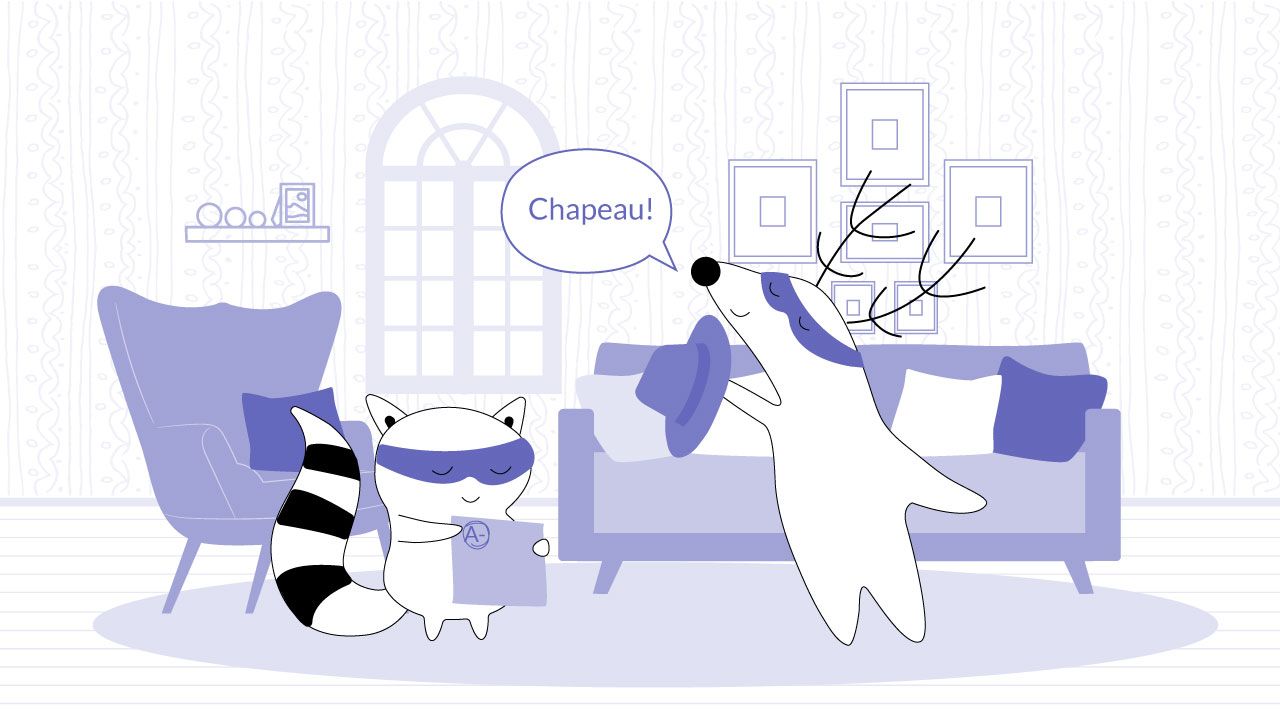
This is just another example of funny French words that are not amusing because of how they sound but because of how they are used.
Now, where would you say the word “hat?” In the clothing store, right? Well, many French speakers often use it to say «Good job!», «Bravo!», or “Congratulations!” Just imagine coming up home with an A+ mark on your exam sheet, and your dad says “hat!” Personally, it would leave us with mixed feelings.
There’s no strange story behind that, though – this funny French slang simply refers to the act of someone tipping their cap to you.
French
English
Chapeau, Marie ! C’est magnifique !
Good job, Mary! This is beautiful!
Pisser dans un violon
Now, isn’t this phrase just amazing to you? Literally translated, it describes someone who is trying to do something useless, like pissing into a violin. We’re not sure how this one came about, but we bet that it was created by someone with a very vivid imagination.
This phrase is often used to describe people who are overreaching, just too confident in their abilities, or are just trying to do something hopeless.
French
English
Tu veux lui donner de la crypto comme cadeau ? Ce n’est pas un peu… pisser dans un violon ?
You want to give him crypto as a gift? Isn’t it a bit… useless?
La barbe à papa
This is a very amusing word for «cotton candy» in French, and it literally means «dad’s beard.» We’re not sure if this is because dads get a sweet beard when eating it or just because they already have beards that resemble cotton candy. Maybe both?
In any case, we think that this is a very creative and funny way to describe this type of sweet treat!
French
English
J’adore la barbe à papa !
I love cotton candy!

Ça ne casse pas trois pattes à un canard
This is one of the most popular and funny French idioms, which literally means «it doesn’t break three legs of a duck.» In other words, it’s not a big deal – “nothing to write home about,” as we’d say in English.
This phrase is often used to describe something that is very easy to do or that doesn’t require any special effort. For example, if you’ve just found out your friend broke up with her toxic boyfriend, you might have this kind of a conversation:
French
English
Vous avez rompu avec Stan récemment ? Pourquoi tu n’as rien dit ? – Ah, ça ne casse pas trois pattes à un canard.
You broke with Stan recently? Why didn’t you say anything? – Ah, it’s nothing to write home about.
Pédaler dans la semoule
This is one of the funniest French idioms, which literally means «to pedal in semolina» (semolina is a type of very fine wheat flour). In other words, it means to struggle or to go around in circles. In our opinion, though, the English equivalent of this phrase is less descriptive when it comes to showing the effort a person makes to get out of a tough situation.
French learners might experience pédaler dans la semoule when trying to move to higher levels of language knowledge and getting stuck.
French
English
Je suis bloqué au niveau B1 depuis des années mais je ne peux pas aller plus haut ! J’ai l’impression de pédaler dans la semoule.
I’ve been stuck of B1 level for years but can’t move higher! It feels like I’m pedaling through semolina.
En faire tout un fromage
This is one of the most peculiar French sayings, which literally means «to make a cheese out of it.» In other words, it means to make a big deal out of something that is actually not that important. In English, we’d say that someone makes something out of nothing, or, in a more expressive way, “makes mountains out of molehills.”
French people use this phrase in many different situations. You can say it, for example, when your friend is overreacting about getting a C on their math test.
French
English
Arrête de faire tout un fromage ! Ce n’est qu’un C, ce n’est pas la fin du monde.
Stop making such a big deal about it! It’s just a C, it’s not the end of the world.
It’s also one of the many cheese idioms that French has – for example, have you heard about the phrase “three cheeses high?”
Devenir chêvre
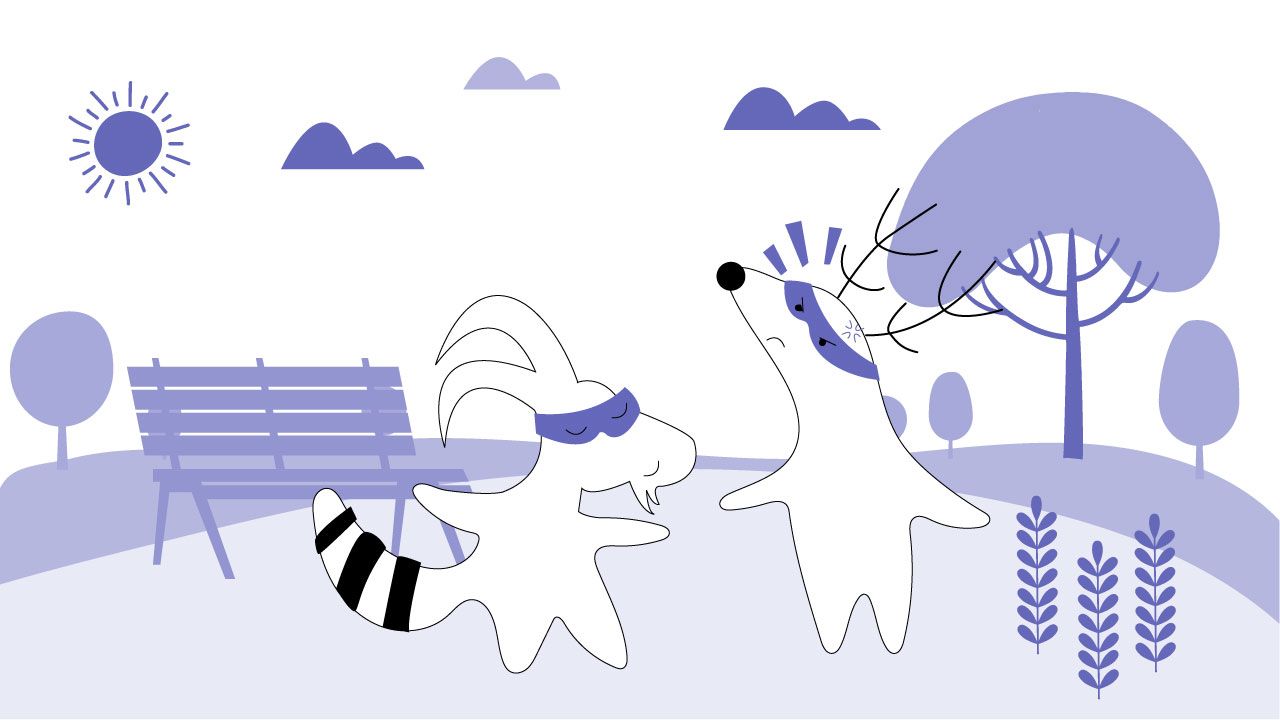
This phrase literally means «to become a goat,» but it actually has nothing to do with animals. In fact, it’s used to describe someone who has been driven mad by something. In English, a similar phrase would be “to go nuts.”
For example, imagine talking to a French person who’s speaking very quickly and with a strong accent – and your listening skills just don’t allow you to understand what they’re saying. Moreover, you need to go to the bathroom, and they can’t seem to explain where it is in a simple way! Anyone would go crazy in such a situation.
French
English
…il était en train de parler de quelque chose, et je voulais juste aller aux toilettes. Et je suis devenue chèvre et j’ai commencé à lui crier dessus…
…he was going on and on about something, and I just wanted to go to the bathroom. And I just became a goat and started shouting at him…
Être au taquet
This is one of the most useful French idioms, which generally means to be at the limit, to be at the maximum of your possibilities, or even to do your best. You can use it when you’re trying your hardest or making an effort to achieve something.
French
English
Je vais au taquet pour réviser pour mon examen.
I’m going flat out to study for my exam.
The literal translation of this phrase refers to the piece of wood put between a door and a wall to block it (to be a wedge). It basically means that someone is working very hard with the expectation that something good will happen.
Explore the World of Fun French Words
The French language is a trove of idiomatic expressions that can make your learning experience much more engaging. Knowing them won’t only allow you to understand native speakers better, but you’ll also communicate with them in a more nuanced way.
Moreover, it’s important to remember that language spreads much further than simple, basic vocabulary and being able to express your needs is just a start. If you want to really become fluent in French, it’s especially important to learn how to use idioms and slang in everyday conversations.
Funny words in French are not just funny words – if you can use them properly, they are proof that you are moving higher on the level ladder and really making the French language your own. And if you want to learn something else, make sure to check our article about the most beautiful French words as well.
Loosen your jaw muscles, it’s time for few odd french sounds, words, and expressions! No french lesson would be complete without it 
(As an Amazon affiliate, we may earn commissions on purchases. All information provided is for entertainment purposes only, see our disclosure policy.)
If you’ve lived in France for a while, you will notice that there are certain “words” your French teacher didn’t tell you about: all those weird and funny French words in French that don’t sound that they are actual words.
You won’t find them in any dictionary or grammar book, but no French language education would be complete without a few shoulder shrugs, eye rolls, and exasperated sighs. (Bonus points if you are holding a baguette at the same time.)
So loosen your jaw muscles, it’s time to learn a few odd french sounds, words and expressions. Allons-y!
☞ READ MORE: Top French travel phrases for every occasion
Funny French words that are actually sounds
1. Allez hop! – There you go!
So “hop” is not actually a word that means anything French. Nevertheless, if you’re serving up pancakes (or crêpes!) and you spatula over a crêpe into a friend’s plate. You can add a little “Allez hop!” as you go.
2. Ben, Oui! – Duh, yeah!
I don’t know why kids love this expression, both of mine adopted this around the age of two. Note: The N at the end is not pronounced, it is more like “Beh”, than “Ben”.
- Me: “Do you want some milk?, Kid: Ben, Oui!”
- Kid: “Is the sky blue?”, Me: Ben, Oui!“
Either way, I would recommend that you not say this to a person of authority, like your boss, or a customs TSA officer.
3. Houp là! – Oops!
Almost slip on a toy car while carrying that big birthday cake with all the candles on? “Houp là!” (If you watch the British series Peppa Pig, Daddy Pig regularly says Houp Là in both the English and in the French versions. Some things I guess, do cross the channel.)
4. Ooh la la! – Oh dear!
“Ooh la la, is it really possible that French people say Ooh la la!?” In a word yes. It is not a stereotype, French people actually use Ooh la la in all sorts of situations to express:
- Surprise – “Ooh la la, what have you done!?”
- Wow – “Ooh la la, that’s amazing!”
- Negative reaction – “Ooh la la, you’re starting to annoy me!”
There are bonus points if you can “ooh la la la la la la“, with as many extra la’s as possible.
5. Pfff! – (sigh, with eyeroll)
“And then she came over to my place for a drink and didn’t even bring any macarons! Pffff!” I recommend rolling your eyes and gazing at the ceiling as you say this to your French family.
6. Oula! – Wow!
“Oula, isn’t that just the biggest engagement ring you’ve ever seen!” (Actually, French people wouldn’t say this, large engagement rings are not the trend in France.)
Along with “wow”, it is also an expression of alarm, as in “whoa there!”. For instance “Oula, qu’est-ce qui s’est passé!? Le lait est partout!” This would translate as “Omg, what happened!? The milk is everywhere!”
7. Ouah – Yeah
Just like Yeah in English is slang for Yes, Ouah is slang for Oui.
- Friend: “Wanna go for happy hour?”, Me: Ouah!”
If you are wondering, the French word for “Happy Hour” is “Apéro“, or you can just use “happy hour”, without pronouncing the H’s.
8. Aïe, Aïe, Aïe – Yikes!
“Aïe, aïe, aïe, I just stepped in some dog pooh!”
The stereotype of the Parisian not picking up after his/her dog is still true, but it is getting better. A bit.
9. Hein? – Huh?
Tourist in a restaurant: “Can I have some ketchup for my Confit au canard?, Waiter: Hein?”
Yes, that is exactly the look that the waiter will give you if you ask for ketchup. (Read more French dining do’s and don’ts here.)
10. Bof – (dislike)
Me: “How was the new gym?, French friend: “Bof, nothing to write home about!”
Weird and Funny Words which don’t mean what they say
1. Abracadabrantesque
English Translation: Abra-ca-dabra-esque
Meaning: Magically
An example of this very long word would be politicians arguring about “Une politique abracadabrantesque“, meaning a “rather farfetched politics”, except in not so polite terms. (All politicians are a bit abracadabrantesque, no?)
2. Cartonner
English Translation: Packing cartons
Meaning: Highly successful
If you remember the song “We’re movin’ on up”, from the hit TV show The Jeffersons, this would be “cartonner”. Packing up the boxes, because you’ve hit the big time and can move on up.
3. Crapoter
English Translation: Puffing, smoking without inhaling
Meaning: Pretending
“I smoked but I didn’t inhale!” Crapoter literally translates into not inhaling, but more broadly means pretending to do something.
4. Hurluberlu
English Translation: Hurly Burly
Meaning: eccentric or weird person
This is an older expression and means a bit scatter-brained or strange. For Mr. Bean fans, he might be considered a hurluberlu.
5. Déjanter
English Translation: Popping a car tire off its rim
Meaning: Become a bit crazy
“The wheels are coming off his campaign!” Or in other words, “il est déjanté!“, meaning he is a bit off his head.”
6. Dépaysant
English Translation: De-Countryfy-ing
Meaning: Disorienting, letting go of habits
Pays means “country” and Paysanne means “person who lives in the countryside”. So dépaysant, means to de-country-fy, but it actually means disorienting, or changing and letting go of old habits.
For example, “oui, j’ai adoré, mes vacances en Espagne étaient trés dépaysant!“, meaning “yes, I loved it, my holidays in Spain were very refreshing.”
7. Machin
English Translation: Thing
Meaning: What-cha-ma-call-it
“Il demande ce machin ou la, tout le temps!” meaning “he is asking for this random thing or that, all the time”.
8. Prout
English Translation: the sound “Toot”
Meaning: the sound of flatulence
A polite way to say that someone farted! No additional explanation needed 😉
9. Monsieur Untel/ Madame Unetelle
English Translation: Mr and Mrs Untel
Meaning: Mr. and Mrs. So-and-So
Untel is not really a word, but a sound to say Mr. and Mrs. So-and-So. “Et en suite, j’ai parlé avec M. et Mme Untel, avant aller au déjeuner“, meaning “and then I spoke with so-and-so, before going to lunch”.
10. Saperlipopette
English Translation: Another way to say “Sacre bleu!”
Meaning: A polite way of swearing
There is no actual meaning to the word “saperlipopette”, it is a polite way of swearing, without actually saying the words.
It is rather old-fashioned and cute, and actually has recently been used as a brand name for restaurants and other ventures.
11. Ras le bol
English Translation: Pocket bowl
Meaning: Fed Up!
Ras is not really a word in French by itself, it could mean pocket, or it could mean to reassemble. And bol means bowl. However, when you put “ras le bol” together, it is an expression of deep frustration. “Ugh, j’ai ras le bol de mon taf”, meaning “I’m fed up of my work”!
12. Pantouflard
English Translation: Someone who loves wearing pantoufs (which means “house slippers” in French)
Meaning: Someone who likes to stay home all day
If you enjoy hanging around in those cute and fluffy slippers (that may or may not have bunny years on them”) you may be a pantouflard.
13. Vachement
English Translation: Like a cow
Meaning: So much, a lot
A vache is a cow in French, so at first glance, the French word “vachement” doesn’t make any sense. “Il a pris vachement longtemps“, meaning he took a really long time.
14. Pomme de Terre
English Translation: Apple of the ground
Meaning: Potato
I don’t know why potatoes have turned into “apples of the ground”, but there you have it. See here for more funny French food expressions.
15. Yaourter
English Translation: Making yogurt
Meaning: singing badly off-key
You know when you are humming along to a song, without actually knowing all the lyrics? That would be “Yaourter” or “Chanter en yaourt“.
It is often used to describe small children singing along to nursery rhymes or songs that they don’t quite master. That person who is terrible at karoke? He/she is yaourt-ing!
16. Farfelou
Meaning: Farfetched, Ridiculous
I just like the sound of this word, which is is not actually a word a proper word with conjugation, but a series of sound. Farfelou, indeed.
French children’s funny words
Young kids say a lot of funny things. And it adds a whole different level when those kids are born-and-bred little Frenchies.
Things that we are used to hearing in North America, are slightly different in France. It stands to reason I suppose, the language is not the same, but even after living in France for several years, I was surprised when my children started school and began coming home with different words that I hadn’t heard of.
Here is a collection of funny sayings, sounds, and phrases that you will mostly hear from French children.
1. “Berk” instead of “Yuck”
The correct pronunciation of “Berk” includes a throwing up reflex if you can manage that. I don’t know the linguistic origins of “Yuck”, so who is to say our common latin ancestors didn’t say “Berk” instead?
2. “Aiee” instead of “Ow!”
Drop a hammer on your foot? Aieeee!
The aieeeeee can go quite long, so prepare your vocal cords!
3. Oh la la!
On top of any french list of funny things kids say has to be when your 2-year old first comes home saying Oh la la. My kids can even do the extra inflections of the “la’s” with “oh la la la la la la!”
4. Caca Boudin
The first “gros mot” or swear word on the list. Every French child comes home from school saying this, it is as inevitable as the sun coming up in the morning. Caca is obviously caca and boudin is a type of sausage. So you can see where they are going with this.
☞ READ MORE: Caca Boudin: Your French Child’s first swear word
5. Bébé Cadum!
This is an odd one because it is actually a famous brand name of a baby hydrating cream. The ad has adorably chubby babies in it, which adults can lovingly coo over.
And there in lies the problem, at least in the minds of your young French Child. To them, bébé cadum is an insult, because of course he/she is no longer a baby! How dare you call them a baby!?
6. Speederman
Hello Spiderman, meet the French accent. Every anglophone parent in France just sighs and desperately tries to correct this “speederman” business before the North American side of the family hears your little one say this. But there seems to be no help for it, at least as far as I can tell.
☞ READ MORE: Reverse Culture Shocks after disconnecting from the American way of life
7. Ca casse les oreilles
To translate literally, this means “that is breaking my ears!”. Obviously a phrase uttered by a very exhausted and exasperated teacher, which has been picked up by those little monsters. I feel for the teacher.
☞ READ MORE: The French School Education System
8. J’ai le droit de faire ça!
Translation: “I have the right to do this!”
Alright, this one wouldn’t really be funny, except I promise you it really is when it is a 3-year-old saying it to you.
Because you are never too young to start protesting for your rights, your little French Revolutionary will throw this around as he is insisting he has the right to keep playing instead of having a bath tonight. What is it with kids and baths, I ask you??
9. Pan pon
If you were not sure what “pan pon” is, in the head of your little French child, it is the sound that a fire truck makes. With the nasally n at the end of course.
French kids are experts at the nasal n at the end, because of course it is also in the word “Maman“.
French Animal Sounds
And now on to animal sounds. Who knew that even the animals make speak a different language? I could do a whole separate post on this, but anyway here goes:
1. Cocorico! – Cock
It is the national symbol of France, so who is willing to argue with the French that the sound cocks make is not “Cock-a-doddle-do” but Co-co-ri-co? I’m not sure you are going to win that argument.
2. Coin coin – Duck
No, that french duck is not saying quack, but rather “coin coin” with a nasally “n” at the end. Now you know.
3. Hi Han – Donkey
More nasally n’s here with the donkey, instead of the anglophone “hee-haw”. You also write the first part as “hi” instead of “hee” but they are both pronounced the same, since in French there are not really any words with “ee” in them.
4. Meuh – Cow
That sweet little cow is not saying “mooo”, but rather more of a curt “meuh” with the h at the end. I suppose it could be different species of cows, but the milk still tastes as sweet, doesn’t it? (Unless you are lactose intolerant, of course!)
Once you find yourself throwing out “bofs” and “bens” all over the place, congratulations, you are well on your way to becoming French! If you enjoyed that article, you may want to read about more funny French phrases and idioms here as well as other useful phrases.
I also have a small selection of funny french words that you can download below in flashcard format. A bientôt!

 machin
machin 
